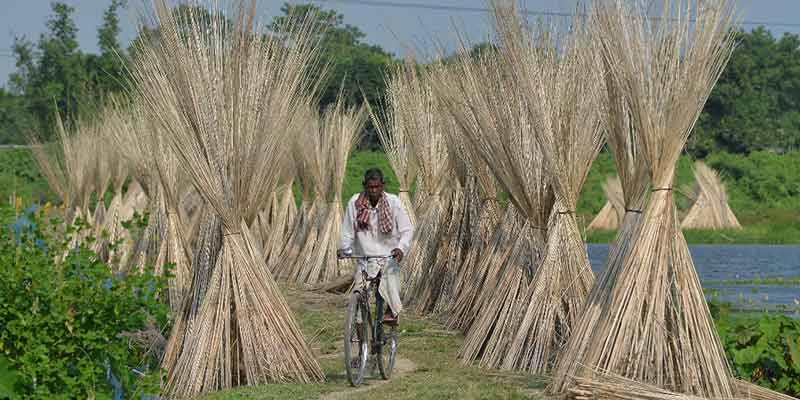- India
- Oct 30
Govt makes packaging of food grains in jute bags mandatory
To help the jute industry, the Union Cabinet has decided to extend the norms for mandatory packaging of 100 per cent food grains and 20 per cent sugar in diversified jute bags.
The government has expanded the scope of mandatory packaging norms under the Jute Packaging Material (JPM) Act, 1987.
What is the significance of this decision?
• Nearly 3.7 lakh workers and several lakh farm families are dependent for their livelihood on the jute sector. The jute industry is predominantly dependent on the government sector, which purchases jute bags worth over Rs 7,500 crore annually for packing food grains.
• The decision will benefit farmers and workers in the eastern and northeast regions of the country, particularly in West Bengal, Bihar, Odisha, Assam, Andhra Pradesh, Meghalaya and Tripura.
• Under the Jute Packaging Materials (Compulsory Use in Packing Commodities) Act, 1987, the government is required to consider and provide for the compulsory use of jute packaging material in the supply and distribution of certain commodities in the interest of production of raw jute and jute packaging material and of persons engaged in the production thereof.
• Therefore, the reservation norms in the present proposal would further the interest of domestic production of raw jute and jute packaging material in the country.
• The decision also mandates that initially 10 per cent of the indents of jute bags for packing food grains would be placed through a reverse auction on the Government e-Market (GeM) portal. This will gradually usher in a regime of price discovery.
• In case of any shortage or disruption in the supply of jute packaging material or in other contingency/exigency, the ministry of textiles may, in consultation with the user ministries concerned, relax these provisions further.
Jute industry in India
• India is the largest producer of jute in the world. The production of jute including mesta is around 13.5 lakh tonnes covering an area of nearly 7.32 lakh hectare.
• The jute industry is one of the major industries in the eastern region, particularly in West Bengal. It is estimated that the jute industry provides direct employment to 3.7 lakh workers in organised mills and in diversified units including tertiary sector and allied activities and supports the livelihood of several lakh farm families. In addition, there are a large number of persons engaged in the trade of jute.
• The government provides support to the jute growers through MSP operations by the Jute Corporation of India.
• The schemes for promotion of the jute sector are primarily implemented by the National Jute Board, which is a statutory body created for the development and promotion of the sector.
• Jute-ICARE has been launched for increasing the income of jute farmers by at least 50 per cent by using certified seeds, modern agronomic practices in jute cultivation and also by using microbial consortium to upgrade the quality of jute. The programme has shown enormous promise so far.
• The Jute-ICARE interventions have resulted in enhancing the quality and productivity of raw jute and increasing income of jute farmers by Rs 10,000 per hectare.
• Under the Jute-ICARE, the government has been supporting about two lakh jute farmers by disseminating improved agronomic practices such as line sowing using seed drills, weed management by using wheel-hoeing and nail-weeders, distribution of quality certified seeds and also providing microbial assisted retting.
• Recently, the Jute Corporation of India has entered into MoU with National Seeds Corporation for distribution of 10,000 quintals of certified seeds on commercial basis also.
• The intervention of technology upgradation and distribution of certified seeds would increase the productivity and quality of jute crops and also boost the income of the farmers.
• With a view to support the diversification of the sector, the National Jute Board has collaborated with the National Institute of Design and a Jute Design Cell has been opened in Gandhinagar.
• The promotion of Jute Geo-Textiles and Agro-Textiles have been taken up with the state governments, particularly those in the northeast region and also with departments such as ministry of road transport and ministry of water resources.
• A software platform ‘JUTE-SMART’ (Jute Sacking Supply Management and Requisition Tool) has been set up for procurement of jute sacking from November 1, 2016.
Manorama Yearbook app is now available on Google Play Store and iOS App Store

